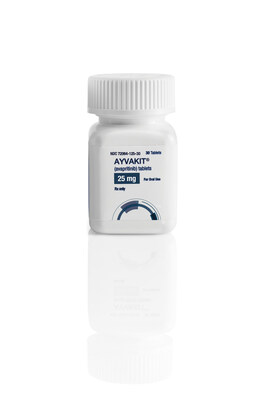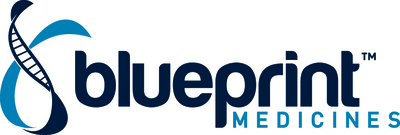FDA Approves AYVAKIT® (avapritinib) as the First and Only Treatment for Indolent Systemic Mastocytosis
-- For the first time, patients with indolent SM have a medicine that treats the primary disease driver and is proven to provide broad and durable symptom relief --
-- Approval based on the positive PIONEER trial, in which once-daily AYVAKIT achieved significant improvements in disease symptoms and measures of mast cell burden, with a safety profile that compared favorably to placebo --
--
Systemic mastocytosis (SM) is a rare hematologic disorder that can lead to a range of debilitating symptoms across multiple organ systems and a significant impact on patients' quality of life. ISM represents the vast majority of SM cases, and AYVAKIT is now available for adults with ISM at the recommended dose of 25 mg once daily. AYVAKIT was designed to potently and selectively inhibit KIT D816V, the primary underlying driver of the disease. AYVAKIT has been FDA approved for the treatment of advanced SM since
"Today's approval of AYVAKIT reflects more than a decade of collaboration and leadership in the field of systemic mastocytosis, during which our team at
"After decades of caring for people with indolent systemic mastocytosis, I have seen firsthand its profound impact on patients' underlying mast cell burden, symptoms, physical and mental health, and ability to work and participate in daily activities," said
The approval of AYVAKIT in ISM is based on data from the double-blind, placebo-controlled PIONEER trial – the largest study ever conducted for this disease – in which patients received AYVAKIT 25 mg once daily plus best supportive care (AYVAKIT) or placebo plus best supportive care (placebo). AYVAKIT demonstrated significant improvements versus placebo in the primary and all key secondary endpoints, including overall symptoms and measures of mast cell burden.
AYVAKIT was well-tolerated with a favorable safety profile compared to placebo, and most adverse reactions were mild to moderate in severity. The most common adverse reactions for AYVAKIT (≥10 percent) were eye edema, dizziness, peripheral edema and flushing. Serious adverse reactions and discontinuations due to adverse reactions occurred in less than 1 percent of patients.
Detailed results from the PIONEER trial, including open-label extension study data showing the clinical benefits of AYVAKIT through 48 weeks of treatment, were presented in
"People with indolent systemic mastocytosis are significantly impacted by their disease symptoms, and many individuals self-isolate at home to protect against unpredictable external triggers. Ultimately, the disease can disrupt an individual's quality of life, career and ability to interact with family and friends, and those affected often face frequent healthcare visits and significant polypharmacy burden," said
Investor Conference Call Information
Blueprint Medicines will host a live conference call and webcast today at 4:30 p.m. ET to discuss the FDA approval of AYVAKIT in ISM. The conference call may be accessed by dialing 833-470-1428 (domestic) or 404-975-4839 (international), and referring to conference ID 832860. A webcast of the call will also be available under "Events and Presentations" in the Investors & Media section of the Blueprint Medicines website at https://ir.blueprintmedicines.com/. The archived webcast will be available on the Blueprint Medicines website approximately two hours after the conference call and will be available for 30 days following the call.
About AYVAKIT (avapritinib)
AYVAKIT (avapritinib) is a precision therapy approved by the FDA for the treatment of three indications: adults with ISM, adults with advanced SM, including aggressive SM (ASM), SM with an associated hematological neoplasm (SM-AHN) and mast cell leukemia (MCL), and adults with unresectable or metastatic gastrointestinal stromal tumor (GIST) harboring a PDGFRA exon 18 mutation, including PDGFRA D842V mutations. For more information, visit AYVAKIT.com. This medicine is approved in Europe (AYVAKYT®) for the treatment of adults with ASM, SM-AHN or MCL, after at least one systemic therapy, and adults with unresectable or metastatic GIST harboring the PDGFRA D842V mutation. Please click here to see the full U.S. Prescribing Information for AYVAKIT, and click here to see the European Summary of Product Characteristics for AYVAKYT. AYVAKIT/AYVAKYT is not approved for the treatment of any other indication in the U.S. or Europe.
To learn about ongoing or planned clinical trials, contact Blueprint Medicines at medinfo@blueprintmedicines.com or 1-888-BLU-PRNT (1-888-258-7768). Additional information is available at blueprintclinicaltrials.com or clinicaltrials.gov.
About Systemic Mastocytosis
Systemic mastocytosis (SM) is a rare disease driven by the KIT D816V mutation in about 95 percent of cases. Uncontrolled proliferation and activation of mast cells result in chronic, severe and often unpredictable symptoms across multiple organ systems. The vast majority of those affected have indolent systemic mastocytosis (ISM). A broad range of symptoms, including anaphylaxis, maculopapular rash, pruritis, diarrhea, brain fog, fatigue and bone pain, frequently persist in patients with ISM despite treatment with multiple symptom-directed therapies. This burden of disease can lead to a profound, negative impact on quality of life. Patients often live in fear of severe, unexpected symptoms, have limited ability to work or perform daily activities, and isolate themselves to protect against unpredictable triggers. Historically, there had been no approved therapies for the treatment of ISM.
A minority of patients have advanced SM, which encompasses a group of high-risk SM subtypes including ASM, SM-AHN and MCL. In addition to mast cell activation symptoms, advanced SM is associated with organ damage due to mast cell infiltration and poor survival.
Important Safety Information
Intracranial Hemorrhage—Serious intracranial hemorrhage (ICH) may occur with AYVAKIT treatment; fatal events occurred in <1% of patients. Overall, ICH (eg, subdural hematoma, ICH, and cerebral hemorrhage) occurred in 2.9% of 749 patients who received AYVAKIT in clinical trials. In Advanced SM patients who received AYVAKIT at 200 mg daily, ICH occurred in 2 of 75 patients (2.7%) who had platelet counts ≥50 x 109/L prior to initiation of therapy and in 3 of 80 patients (3.8%) regardless of platelet counts. In ISM patients, no events of ICH occurred in the 246 patients who received any dose of AYVAKIT in the PIONEER study.
Monitor patients closely for risk factors of ICH which may include history of vascular aneurysm, ICH or cerebrovascular accident within the prior year, concomitant use of anticoagulant drugs, or thrombocytopenia.
Symptoms of ICH may include headache, nausea, vomiting, vision changes, or altered mental status. Advise patients to seek immediate medical attention for signs or symptoms of ICH.
Permanently discontinue AYVAKIT if ICH of any grade occurs. In Advanced SM patients, a platelet count must be performed prior to initiating therapy. AYVAKIT is not recommended in Advanced SM patients with platelet counts <50 x 109/L. Following treatment initiation, platelet counts must be performed every 2 weeks for the first 8 weeks. After 8 weeks of treatment, monitor platelet counts every 2 weeks or as clinically indicated based on platelet counts. Manage platelet counts of <50 x 109/L by treatment interruption or dose reduction.
Cognitive Effects—Cognitive adverse reactions can occur in patients receiving AYVAKIT and occurred in 33% of 995 patients overall in patients who received AYVAKIT in clinical trials including: 28% of 148 Advanced SM patients (3% were Grade ≥3), and 7.8% of patients with ISM who received AYVAKIT + best supportive care (BSC) versus 7.0% of patients who received placebo + BSC (<1% were Grade 3). Depending on the severity and indication, withhold AYVAKIT and then resume at same dose or at a reduced dose upon improvement, or permanently discontinue.
Photosensitivity—AYVAKIT may cause photosensitivity reactions. In all patients treated with AYVAKIT in clinical trials (n=1049), photosensitivity reactions occurred in 2.5% of patients. Advise patients to limit direct ultraviolet exposure during treatment with AYVAKIT and for one week after discontinuation of treatment.
Embryo-Fetal Toxicity—AYVAKIT can cause fetal harm when administered to a pregnant woman. Advise pregnant women of the potential risk to a fetus. Advise females and males of reproductive potential to use an effective method of contraception during treatment with AYVAKIT and for 6 weeks after the final dose of AYVAKIT. Advise women not to breastfeed during treatment with AYVAKIT and for 2 weeks after the final dose.
Adverse Reactions—The most common adverse reactions (≥20%) in patients with Advanced SM were edema, diarrhea, nausea, and fatigue/asthenia.
The most common adverse reactions (≥10%) in patients with ISM were eye edema, dizziness, peripheral edema, and flushing.
Drug Interactions—Avoid coadministration of AYVAKIT with strong or moderate CYP3A inhibitors. If coadministration with a moderate CYP3A inhibitor cannot be avoided in patients with Advanced SM, reduce dose of AYVAKIT. Avoid coadministration of AYVAKIT with strong or moderate CYP3A inducers.
To report suspected adverse reactions, contact Blueprint Medicines Corporation at 1-888-258-7768 or FDA at 1-800-FDA-1088 or http://www.fda.gov/medwatch.
Please click here to see the full Prescribing Information for AYVAKIT.
About Blueprint Medicines
Blueprint Medicines is a global precision therapy company that invents life-changing therapies for people with cancer and blood disorders. Applying an approach that is both precise and agile, we create medicines that selectively target genetic drivers, with the goal of staying one step ahead across stages of disease. Since 2011, we have leveraged our research platform, including expertise in molecular targeting and world-class drug design capabilities, to rapidly and reproducibly translate science into a broad pipeline of precision therapies. Today, we are delivering our approved medicines to patients in the United States and Europe, and we are globally advancing multiple programs for systemic mastocytosis, lung cancer, breast cancer and other genomically defined cancers, and cancer immunotherapy. For more information, visit www.BlueprintMedicines.com and follow us on Twitter (@BlueprintMeds) and LinkedIn.
Cautionary Note Regarding Forward-Looking Statements
This press release contains forward-looking statements within the meaning of the Private Securities Litigation Reform Act of 1995, as amended, including, without limitation, statements regarding
Reference
1 Title provided for identification purposes only. The views and opinions expressed are those of the individual only and do not necessarily reflect the positions of the
Trademarks
![]() View original content to download multimedia:https://www.prnewswire.com/news-releases/fda-approves-ayvakit-avapritinib-as-the-first-and-only-treatment-for-indolent-systemic-mastocytosis-301831282.html
View original content to download multimedia:https://www.prnewswire.com/news-releases/fda-approves-ayvakit-avapritinib-as-the-first-and-only-treatment-for-indolent-systemic-mastocytosis-301831282.html
SOURCE
Media Contact Courtney Carroll +1 (781) 264-7302 media@blueprintmedicines.com; Jenna Cohen, +1 (857) 209-3147, ir@blueprintmedicines.com



